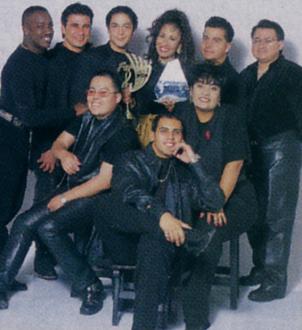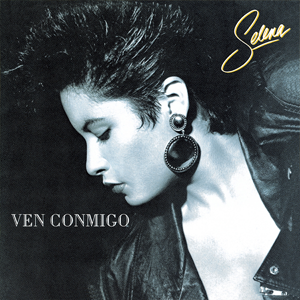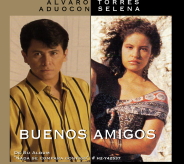
Selena y Los Dinos was an American Tejano band formed in 1981 by Tejano singer Selena and her father Abraham Quintanilla. The band remained together until the murder of Selena in 1995, which caused the dissolution of the band in the same year. When Selena was signed with EMI Latin, EMI president José Behar told Selena that "the world wanted Selena, not Selena y Los Dinos." Selena then began releasing her solo studio albums under her name and her own logo title Selena instead of Selena y Los Dinos. Before Selena was signed with EMI, the band had sold more than 80,000 copies in the state of Texas.

Sasha Sökol Cuillery, known during her childhood and adolescence as Sasha and, from 1997 onwards, as SashaSökol, is a Mexican singer, actress, songwriter and television presenter. She began her artistic career as a member of the musical band Timbiriche.

Ven Conmigo is the second studio album by American singer Selena, released on November 12, 1990, by EMI Latin. The singer's brother, A.B. Quintanilla III remained her principal record producer and songwriter after her debut album's moderate success. Selena's Los Dinos band composed and arranged seven of the album's ten tracks; local songwriter Johnny Herrera also provided songs for Selena to record. Ven Conmigo contains half cumbias and half rancheras, though the album includes other genres. Its musical compositions are varied and demonstrate an evolving maturity in Selena's basic Tejano sound. The album's structure and track organization were unconventional compared with other Tejano music albums. The songs on Ven Conmigo are mostly love songs or songs following a woman's struggles after many failed relationships.

Mis Mejores Canciones – 17 Super Éxitos is a greatest hits album by American singer Selena released on September 17, 1993, through EMI Latin. Beginning in January 1993, the label released a comprehensive collection that spotlighted its Latin music artists as part of its Latin Classics series. Mis Mejores Canciones – 17 Super Exitos encompasses 17 tracks, ranging from songs recorded on her debut album with EMI Latin, to songs present in Entre a Mi Mundo (1992). The album received a positive response from music critics who enjoyed the label's catalog releases and praised the tracks on the album for showcasing Selena's early popular recordings. Following the shooting death of Selena on March 31, 1995, Mis Mejores Canciones – 17 Super Exitos debuted at number one on the US Billboard Top Catalog Albums chart, the first Spanish-language recording to do so. The Recording Industry Association of America (RIAA) certified the album diamond (Latin), denoting 600,000 units shipped in the United States.

All My Hits: Todos Mis Éxitos is a greatest hits album by American singer Selena. It was released posthumously on March 9, 1999, through EMI Latin to commemorate its ten-year anniversary since entering the music industry. The album coincided with the fourth anniversary of Selena's death, though then-president Jose Behar rebuffed the idea that the album was an exploitive ploy by the company. Following Selena's death on March 31, 1995, Abraham Quintanilla expressed his interest in preserving his daughter's memory through her works. Selena's family has been criticized by fans and the media for exploiting the singer and cannibalizing her murder by commercializing her repertoire. According to the singer's brother, A.B. Quintanilla, one of Selena's wishes was for her to "never go away", citing a conversation he shared with Selena and their sister Suzette Quintanilla, that if anything were to happen to any one of them, their wish would be to continue on with their music.

All My Hits: Todos Mis Éxitos Vol. 2 is a greatest hits album by American singer Selena that was released on February 29, 2000, through EMI Latin. After Selena's murder in 1995, her father Abraham Quintanilla stated his commitment to preserving her music and EMI Latin pledged ongoing support for her releases. In 1999, the label's president José Behar acknowledged Selena, who remained the label's top-selling artist, for her contributions to establishing EMI Latin as "the house that Selena built". In March 1999, to commemorate the label's tenth anniversary, it released All My Hits: Todos Mis Éxitos; it achieved commercial success and a sequel was announced. All My Hits: Todos Mis Éxitos Vol. 2 contains 16 songs ranging from tracks featured on Selena's Muñequito de Trapo (1987) to the posthumous 1997 club remix of "Enamorada de Ti" (1990).

Momentos Intimos is a compilation album by American singer Selena and released posthumously on March 23, 2004, through EMI Latin. The album contains 24 tracks, though the last eight are spoken liner notes provided by the singer's family, friends, and her Los Dinos band. The songs on the album range from "Como Te Quiero Yo A Ti" (1988), a re-recorded version modernized and remixed on the album, to "Puede Ser", an unreleased duet with Nando "Guero" Dominguez, recorded two weeks before Selena was shot and killed in March 1995. Following Selena's death, her father Abraham Quintanilla expressed his interest in persevering his daughter's memory through her works. Selena's family has been criticized by fans and the media for exploiting the singer and cannibalizing her murder by commercializing her repertoire.

Willy Chirino is a Cuban-American singer, songwriter, musician and record producer.
Leonardo Paniagua is one of the Dominican Republic's most popular bachata musicians. He emerged from obscurity to overnight stardom in the 1970s, when he recorded his first 45rpm record, "Amada, Amante" for Discos Guarachita.

"Enamorada de Ti" is a song recorded by American Tejano recording artist Selena for her second studio album, Ven Conmigo (1990). The song was written by Selena y Los Dinos band member Pete Astudillo and her brother, A.B. Quintanilla III, and produced by Quintanilla, It is a Spanish-language adaptation of "Is It the Beat?", an English song originally written by Quintanilla III and Pamela Phillips Oland. The English version was recorded by Selena in 1989 for a potential English-language crossover album.
Los Freddy's were a Mexican musical group, founded in 1962 in Guadalajara, Jalisco.
"Dame Un Beso" is a 1986 song by Mexican-American singer Selena, from her third album, Alpha. It was recorded when she was 14 years old. The song was written by A. B. Quintanilla and Ricky Vela, who were both in her band at the time. A. B. Quintanilla, Selena's brother, had grown tired of the more old-fashioned songs that his father would choose and write, and decided to take over and write almost all of her songs.

"Buenos Amigos" is a down-tempo, pop ballad duet recorded by Salvadoran recording artist Álvaro Torres and American recording artist Selena for Torres' sixth studio album Nada Se Compara Contigo (1991). The song was released by EMI Latin in 1992, as the album's second single. Its lyrics explore a friendship built on the strong, unrequited feelings of the male narrator. Torres composed "Buenos Amigos" after attending a showcase event at which Selena was performing.

"No Quiero Saber" is a song recorded by American recording artist Selena. It was originally a track on her second studio album Ven Conmigo (1990). It was composed and produced by her brother, A.B. Quintanilla III. Pete Astudillo, a backup singer with Selena y Los Dinos, produced the song with Quintanilla. The recording was later remixed by Quintanilla III for Selena's 1996 first remix album, Siempre Selena. It was released posthumously by EMI Latin in June 1996, as the album's second single, behind "Siempre Hace Frio".
"Cien Años" is a song written by Mexican songwriters Rubén Fuentes and Alberto Cervantes. It was originally recorded in 1953 by Pedro Infante, who also performed the song in the 1954 film Cuidado con el amor in a famous scene where his character sings it for Elsa Aguirre's character. The song, which went on to become the most successful song of 1954 in Mexico, has been covered by at least 189 performers according to the Mexican Society of Authors and Composers.

Dulce Amor is the sixth and last independent studio album by Tejano music group Selena y Los Dinos. The album became the final album to be released from RP Records on December 24, 1988. Selena's brother, A.B. Quintanilla III had become the main songwriter. Selena recorded fourteen songs but only released ten. All the songs were recorded in three different recording studios. Dulce Amor helped Selena to be noticed at the 1989 Tejano Music Awards. She was then signed by EMI Latin. This would be the last studio album to be released under “Selena y Los Dinos” as all subsequent albums would be released under “Selena”. The album had only sold over 30,000 copies. It was ordered to be removed from stores by EMI Records.

16 Super Éxitos Originales is a greatest hits album by American singer Selena released on March 3, 1990, through EMI Latin. The label aimed to release a compilation containing recordings by Selena y Los Dinos prior to their contractual agreement in 1989, to illustrate the band's musical progressions up to that point. 16 Super Éxitos Originales encompasses 16 tracks re-recorded under new arrangements, ranging from compositions recorded through Freddie Records in 1983 to the group's Dulce Amor (1988) album. The album received critical acclaim from music critics, who found it to have contained recordings that solidified Selena's status in the Tejano music market and introduced her to a broader audience. The album peaked at number 22 on the US Billboard Regional Mexican Albums chart. EMI Latin posthumously re-issued 16 Super Éxitos Originales under the title Mis Primeros Éxitos on August 13, 2002.

Preciosa is the fifth independent studio album by Tejano music group Selena y Los Dinos. It was released on October 10, 1988 under Manny Guerra’s RP Records. Preciosa garnered favorable reception from music critics, with Tim Baker of Newsweek observing the group finally purging their oldie influences from their discography. At the 1989 Tejano music awards, Selena was the finalist for Female Vocalist of the Year. Terco Corazon was nominated for Single of the Year, and A.B was nominated for Songwriter of the Year.














